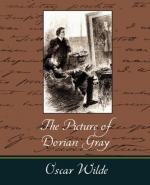Lord Henry laughed. “The reason we all like to think so well of others is that we are all afraid for ourselves. The basis of optimism is sheer terror. We think that we are generous because we credit our neighbour with the possession of those virtues that are likely to be a benefit to us. We praise the banker that we may overdraw our account, and find good qualities in the highwayman in the hope that he may spare our pockets. I mean everything that I have said. I have the greatest contempt for optimism. As for a spoiled life, no life is spoiled but one whose growth is arrested. If you want to mar a nature, you have merely to reform it. As for marriage, of course that would be silly, but there are other and more interesting bonds between men and women. I will certainly encourage them. They have the charm of being fashionable. But here is Dorian himself. He will tell you more than I can.”
“My dear Harry, my dear Basil, you must both congratulate me!” said the lad, throwing off his evening cape with its satin-lined wings and shaking each of his friends by the hand in turn. “I have never been so happy. Of course, it is sudden— all really delightful things are. And yet it seems to me to be the one thing I have been looking for all my life.” He was flushed with excitement and pleasure, and looked extraordinarily handsome.
“I hope you will always be very happy, Dorian,” said Hallward, “but I don’t quite forgive you for not having let me know of your engagement. You let Harry know.”
“And I don’t forgive you for being late for dinner,” broke in Lord Henry, putting his hand on the lad’s shoulder and smiling as he spoke. “Come, let us sit down and try what the new chef here is like, and then you will tell us how it all came about.”
“There is really not much to tell,” cried Dorian as they took their seats at the small round table. “What happened was simply this. After I left you yesterday evening, Harry, I dressed, had some dinner at that little Italian restaurant in Rupert Street you introduced me to, and went down at eight o’clock to the theatre. Sibyl was playing Rosalind. Of course, the scenery was dreadful and the Orlando absurd. But Sibyl! You should have seen her! When she came on in her boy’s clothes, she was perfectly wonderful. She wore a moss-coloured velvet jerkin with cinnamon sleeves, slim, brown, cross-gartered hose, a dainty little green cap with a hawk’s feather caught in a jewel, and a hooded cloak lined with dull red. She had never seemed to me more exquisite. She had all the delicate grace of that Tanagra figurine that you have in your studio, Basil. Her hair clustered round her face like dark leaves round a pale rose. As for her acting—well, you shall see her to-night. She is simply a born artist. I sat in the dingy box absolutely enthralled. I forgot that I was in London and in the nineteenth century. I was away with my love in a forest




